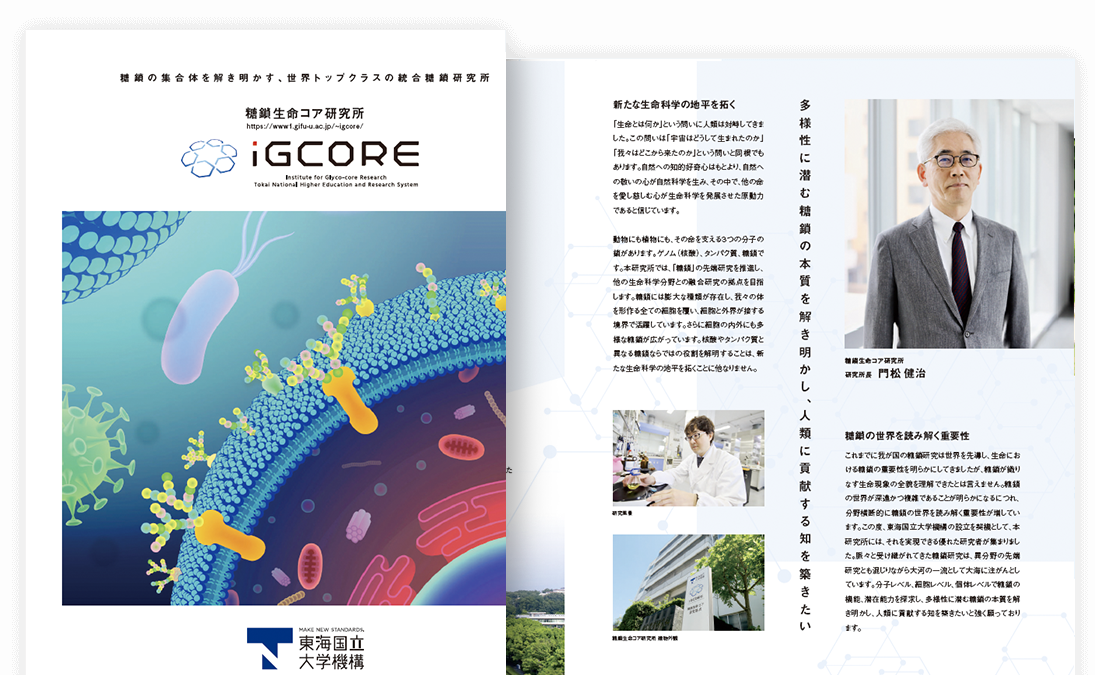RESEARCH
Glyco-Molecular Science Division
Purpose / Contents

Understanding the behaviors of each glycan molecule
In the Glyco-Molecular Science Division in the integrated Glyco-Molecular Science Research Center (iGMOL), our goal is to elucidate the principles of the behavior of individual glycans in cells. To achieve this, we aim to synthesize individual glycans, elucidate their biosynthetic mechanisms, and determine their structures. Additionally, we analyze the dynamics of individual glycans by utilizing single molecule imaging with synthesized glycan probes and NMR. Glycan-related metabolites are also analyzed for their structure and quantity.
Through these approaches, we will clarify the dynamic behavior and biosynthetic mechanisms of each glycan molecule in living cells. Integrating the knowledge about individual glycans will lead to a better understanding and regulation of their behaviors, biosynthesis, and overall functions.
Examples

Innovation of glycan synthesis
For example, we have recently developed a new innovative method for chemical synthesis of sialylated glycans (Komura et al., Science, 2019, 364, 677-680). Developing such techniques, we try to construct glycan libraries.

The fastest single glycan imaging
We also develop novel glycan probes by labeling glycans with fluorescence or search for new glycan binding molecules. Using these probes, we visualize the dynamics of a single glycan in cell membrane (Komura et al., Nat. Chem. Biol., 2016, 12, 402-410).

Understanding, prediction and remodeling of glycan biosynthesis
We focus on glycan-biosynthetic enzymes (glycosyltransferases) and aim to elucidate the mechanisms of their reactions and regulation using biochemical and genetic approaches. We also integrate glycosyltranasferase data to predict and remodel cellular glycan structures (Nagae et. al., Nat. Commun., 2018, 9, 3380, Huang et. al., Dev. Cell, 2021, 56, 1195-1209).
Members List
Kenichi G. N. Suzuki
Division headGlyco-Molecular Science Division
- Research interests
- Single molecule imaging, super resolution imaging, glycolipid, GPI-anchored protein, signal transduction
- Research subject
- Using single molecule and super-resolution imaging techniques, we aim to elucidate the organization and functions of cell membranes. In particular, we aim to elucidate the roles of glycans in dynamic microdomain formation on living cell membranes and in the promotion and regulation of signal transduction.
Hiromune Ando
Vice-DirectorGlyco-Molecular Science Division
- Research interests
- Carbohydrate chemistry, chemical biology, sialic acid, molecular probe, virus infection
- Research subject
- We particularly focus on the chemical synthesis of glycans containing sialic acid, which is a sugar present on the cell surface. Sialic acid-containing glycans are closely related to diseases, such as viral invasion and malignant transformation of cancer. We have developed a powerful method for chemical synthesis and succeeded in synthesizing more than 300 kinds of sialic acid-containing glycans. Recently, we have succeeded for the first time in the world in visualizing dynamically moving glycans in the plasma membrane of living cells through interdisciplinary research with biophysics. By further advancing such research, we aim to unveil the real picture of glycans, which has not been possible to observe, and to understand the functions of glycans in biological processes.
Yasuhiko Kizuka
ChairGlyco-Molecular Science Division
- Research interests
- Glycosyltransferase, N-glycan
- Research subject
- We focus on glycosyltransferases which form branching structures of N-glycans and try to reveal the regulation mechanisms of their activity and disease relevance. We take a biochemical approach in combination with structural biology, chemistry, and glycomics. We have revealed that deficient mice for a specific glycosyltransferase show the improved Alzheimer’s disease pathology, and tertiary structures and acceptor protein selectivity of cancer-related glycosyltransferase GnT-V and diabetes-related GnT-IV. Moreover, we develop glycan probes and glycosyltransferase inhibitors.
Masato Ikeda
Glyco-Molecular Science Division
- Research interests
- Supramolecular chemistry, nanobiomaterial, chemical biology
- Research subject
- We design and synthesize new hybrid molecules that have multiple molecules as modules, including glycans. We study their biological functions, construction of nanostructures by molecular assembly, and generation of biofunctional materials.
Akihiro Imamura
Glyco-Molecular Science Division
- Research interests
- Organic synthesis, glycochemistry, glycolipids, glycosidase, galectin, human milk oligosaccharides (HMOs)
- Research subject
- We focus on the chemical synthesis of biologically relevant glycans and glycan-related protein inhibitors. Our focus spans a wide range of glycans, from monosaccharide to oligo- and polysaccharides. We believe that our research based on chemistry contributes significantly to the advancement of the field of glycoscience.
Natsuhisa Oka
Glyco-Molecular Science Division
- Research interests
- Franoside, stereoselective synthesis, domino reaction, inositol, carbasugar
- Research subject
- We develop efficient methods for the synthesis of various chiral cyclopentenes and cyclohexenes by domino reaction using heteroarylsulfones derived from sugars. We will explore efficient routes to convert the resulting cyclopentenes and cyclohexenes into useful compounds such as bioactive natural products, inositol derivatives, and carbasugars.
We also develop a highly stereoselective furanosylation reaction using iodinated sugars as glycosyl donors. This reaction proceeds with complete 1,2-cis selectivity and efficiently yields stereochemically pure furanosides. We aim to use this reaction for efficient synthesis of cell surface glycans.
Masayasu Taki
Glyco-Molecular Science Division
- Research interests
- Fluorescent Probes, Chemical Biology, Fluorescence Imaging, Organelles, Lipid Metabolism
- Research subject
- We aim to create fluorescent probes to visualize the structure and characteristics of cells and various events that occur in cells, and to understand cell functions through fluorescence imaging. Recently, focusing on lipid metabolism, we have succeeded in visualizing the behavior of fatty acids and fat droplets in cells and the characteristics of lipid membranes in real time while the cells are alive. We would like to contribute to the development of glycan research by creating methods for quantitative analysis of the effects of glycans on cellular function and new molecular tools for directly visualizing arbitrary glycans.
Morihisa Fujita
Glyco-Molecular Science Division
- Research interests
- Endoplasmic reticulum, intracellular trafficking, GPI-anchored protein, glycan remodeling
- Research subject
- We focus on the "life cycle of glycoproteins (biosynthesis, intracellular transport, and degradation)" and aim to elucidate the regulatory mechanisms of the life cycle of glycoproteins. In particular, we analyze the biosynthesis and intracellular dynamics of glycosylphosphatidylinositol (GPI)-anchored proteins and paucimannose-containing glycoproteins using genetic, biochemical, and cytological methods. Furthermore, we aim to develop tools to visualize glycan metabolic pathways and to construct glycan-modified host cells, for producing biopharmaceutical glycoproteins.
Tomio Yabe
Glyco-Molecular Science Division
- Research interests
- Proteoglycan, heparan sulfate, sulfation pattern, dietary fiber, intestinal epithelial cell
- Research subject
- We aim to elucidate the regulatory mechanism of physiological actions of heparan sulfate by controlling sulfation patterns in heparan sulfate. In particular, we focus on the mechanism of action of intestinal epithelial cells that respond specifically to the polysaccharide structure of dietary fiber. We analyze the mechanism by which heparan sulfate structures at the basement membrane are regulated by interaction between cell surface proteins and dietary fiber.
Hide-Nori Tanaka
Glyco-Molecular Science Division
- Research interests
- Glycan, ADP ribose chain, selective synthesis, protection-free synthesis, chemoenzymatic synthesis
- Research subject
- Based on synthetic chemistry, we aim to unveil and manipulate the biological functions of glycans and ADP-ribose chains, which are post-translational modifications of proteins.
Synthetic chemistry is extremely important in life science research because it can provide molecules that are structurally homogeneous and pure, but the synthesis of these molecules requires a great deal of effort and time. This has been the bottleneck in research on both molecules. Therefore, I work on the rapid and efficient synthesis of glycans and ADP-ribose chains by using selective synthesis, protection-free synthesis, and chemoenzymatic synthesis. Our unique synthetic chemistry will break through the bottleneck and dramatically advance life science focusing on both molecules.
Yuichi Abe
Glyco-Molecular Science Division
- Research interests
- proteogenomics, antigen-antibody profiling, post-translational modified proteomics, glycan antigens and glycan antibodies, omics medicine
- Research subject
- I have been involved in the development of clinical proteome analysis technology and its application to translational research. As a unique measurement system, we have realized high-sensitivity proteome analysis of autoantigens contained in immune complexes and their high throughput, and applied them to the search for antigens derived from cancer-specific proteins. Currently, we are further expanding antigen-antibody profiling technology, such as spatiotemporal monitoring of immune complexes and identification of glycan antigens and glycan antibodies. In the future, we would like to contribute to the development of iGCORE by organically integrating our proprietary analysis technology with disease omics obtained from next-generation sequencers, and promoting our own glycan research, such as the search for glycan antigens and glycan antibodies that can be indicators of humoral immune activity.
Naoko Komura
Glyco-Molecular Science Division
- Research interests
- Sialic acid, ganglioside, lipid rat
- Research subject
- We are engaged in chemistry study on sialic acid-containing glycans and chemical biology study using the synthesized glycans. In particular, we focuse on the functions of sialic acid-containing glycolipids (gangliosides) in lipid rafts, which are responsible for signal transduction on the cell membrane.
Naoya Suzuki
Glyco-Molecular Science Division
Research Division
Contact us by phone

052-789-5365
( +81-52-789-5365 )
Weekday, 9:00-17:00
Contact us




